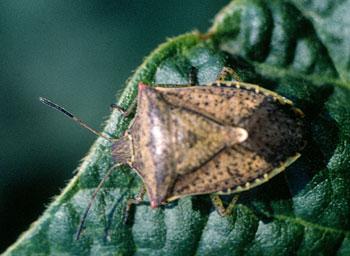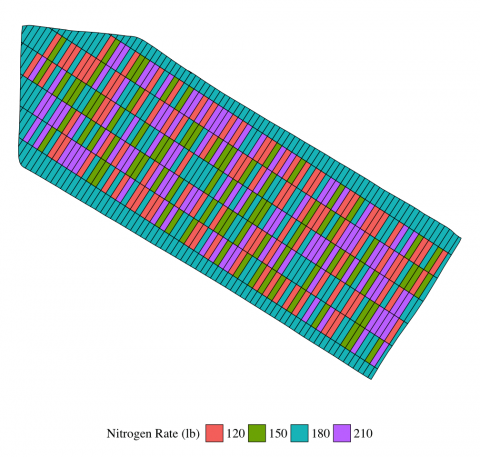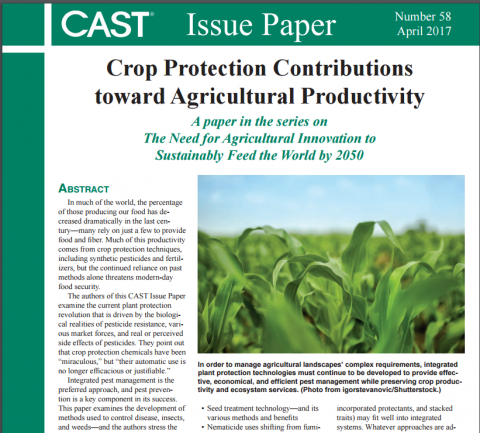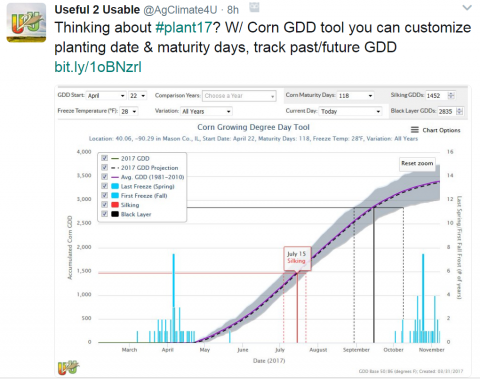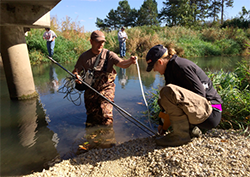A New Stink Bug IPM Resource for Midwest Corn and Soybean Growers
May 5, 2017
In a new article in the Journal of Integrated Pest management the authors review the biology, ecology, and management of several species of stink bugs common to the Midwest, including the green stink bug, brown marmorated stink bug, redshouldered stink bug, brown stink bug, and onespotted stink bug, all of which are found in Nebraska. Photos and drawings would aid in identification in the field.
Research Brief: Ecology and Management of the Alfalfa Weevil
April 28, 2017
If you're growing alfalfa, UNL entomologists recommend a new article in the Journal of Integrated Pest Management: Ecology and Management of the Alfalfa Weevil (Coleoptera: Curculionidae) in Western United States Alfalfa by Makenzie E. Pellissier, Zoe Nelson, and Randa Jabbour.
Multi-State Research Looks at Means for Optimizing Inputs to Enhance Profits
April 21, 2017
Six researchers at the University of Nebraska-Lincoln are working on the USDA-NIFA-funded Data Intensive Farm Management (DIFM) project. DIFM is based at the University of Illinois, and also involves the Universities of Kentucky, Massachusetts, Maryland, and Illinois State. The overarching goal of the project is to collect production data after conducting large-scale, on-farm randomized input use field trials, and then using the information to inform growers of optimal input use practices to enhance their profits.
Mergers and Competition in Seed and Agricultural Chemical Markets
April 10, 2017
Under recent merger proposals, the six global firms that dominate private agricultural chemical and seed research and production would be reduced to four. In the most recent edition of Amber Waves, a USDA Economic Research Service site, economic researchers examine possible effects of these changes in seed and ag chemical markets, including on prices and innovation. The “Big Six” — BASF, Bayer, Dow Chemical, DuPont, Monsanto, and Syngenta — emerged in the 1990s and early 2000s, arising from mergers among large chemical, pharmaceutical, and seed companies as well as from their acquisitions of many smaller seed and biotechnology companies.
Crop Protection Contributions toward Agricultural Productivity, a CAST paper
April 5, 2017
Crop Protection Contributions toward Agricultural Productivity, a paper in the series on the Need for Agricultural Innovation to Sustainably Feed the World by 2050, published by the Council for Agricultural Science and Technology (CAST).
The U2U Corn Growing Degree Day Tool: Tracking Corn Growth Across the US Corn Belt
April 3, 2017
In a recent journal article authors discuss the Corn Growing Degree Day (Corn GDD) tool developed by Useful to Usable (U2U), one of several products that transform existing data into usable products for the agricultural community. The article, published in Climate Risk Management, explores the science behind the tool.
Kansas University Research: ‘Weather Whiplash’ Triggered by Changing Climate will Degrade Midwest’s Drinking Water
April 3, 2017
One consequence of global climate change is the likelihood of more extreme seesawing between drought and flood, a phenomenon dubbed “weather whiplash.” In a peer-reviewed study researchers at the University of Kansas discuss how weather whiplash in the American Midwest's agricultural regions may after water quality, forcing municipalities to seek costly remedies to provide safe drinking water to residents.
Emerging New Technologies for Insect Pest Management
March 31, 2017
Ravdeep Mutti, with the Du-Pont Pioneer Research and Development Center in Johnston, Iowa, will present the seminar, “Emerging New Technologies for Insect Pest Management” on Tuesday, April 4, at 4 p.m. in the Nebraska East Union. Refreshments will be served.
